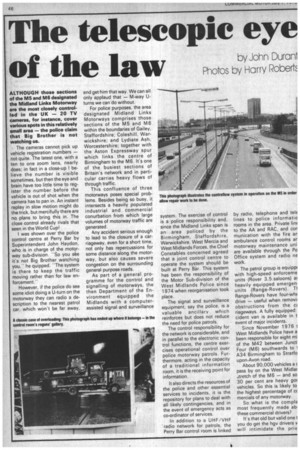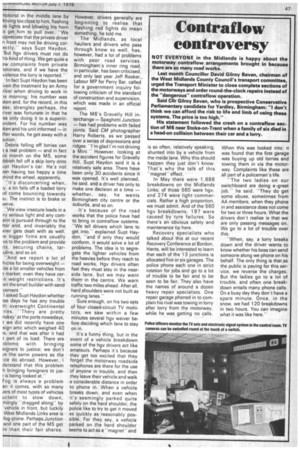The telescopic eye of the law Photos
Page 48

Page 49

If you've noticed an error in this article please click here to report it so we can fix it.
oy John Durcn
oy Harry Rooet
ALTHOUGH those sections of the M5 and M6 designated the Midland Links Motorway are the most closely controlled in the UK — 20 TV cameras, for instance, cover various spots in this relatively small area — the police claim that Big Brother is not watching us.
The cameras cannot pick up vehicle registration numbers — not quite. The latest one, with a ten to one zoom lens, nearly does; in fact in a close-up I believe the number is visible sometimes, but then the eye and brain have too little time to register the number before the vehicle is out of shot when the camera has to pan in. An instant replay in slow motion might do the trick, but mercifully there are no plans to bring this in. The close control already rivals that seen in the World Cup!
I was shown over the police control centre at Perry Bar by Superintendent John Haydon, who is in charge of the motorway sub-division. "So you see it's not Big Brother watching you,he quipped. -The system is there to keep the traffic moving rather than for law enforcement.'"
However, if the police do see some idiot doing a U-turn on the motorway they can radio a description to the nearest patrol car, which won't be far away, and get him that way. We can all only applaud that — M-way Uturns we can do without.
For police purposes, the area designated Midland Links Motorways comprises those sections of the M5 and M6 within the boundaries of Gailey, Staffordshire; Coleshill, Warwickshire; and Lydiate Ash, Worcestershire; together with the Aston Expressway spur which links the centre of Birmingham to the MS. It's one of the busiest sections of Britain's network and in particular carries heavy flows of through traffic.
This confluence of three motorways poses special problems. Besides being so busy, it intersects a heavily populated industrial and commercial conurbation from which large volumes of motorway traffic are generated.
Any accident serious enough to lead to the closure of a carriageway, even for a short time, not only has repercussions for some distance along the motorway, but also causes severe congestion on the surrounding general purpose roads.
As part of a general pro gramme for the control and signalling of motorways, the then Department of the Environment equipped the Midlands with a computerassisted signal and surveillance system. The exercise of control is a police responsibility and, since the Midland Links span is an area policed by the Birmingham, Staffordshire, Warwickshire, West Mercia and West Midlands Forces, the Chief Constables concerned agreed that a joint control centre to operate the system should be built at Perry Bar. This system has been the responsibility of the Motor Sub-division of the West Midlands Police since 1974 when reorganisation took place.
The signal and surveillance equipment, say the police, is a valuable ancillary which reinforces but does not reduce the need for police patrols.
The control responsibility for the network is considerable, and in parallel to the electronic control functions, the centre exercises operational control over police motorway patrols. Furthermore, acting in the capacity of a traditional information room, it is the receiving point for information.
It also directs the resources of the police and other essential services to incidents, it is the repository for plans to deal with all likely contingencies, and in the event of emergency acts as co-ordinator of services.
In addition to a UHF/VHF radio network for patrols, the Perry Bar control room is linked by radio, telephone and tele lines to police informatio rooms in the area. Private linr to the AA and RAC, and cor munication with the fire ar ambulance control rooms ar motorway maintenance uni are available through the Po Office system and radio ne work.
The patrol group is equippi with high-speed enforceme units (Rover 3.5.saloons) ar heavily equipped emergen units (Range-Rovers). TI Range-Rovers have four-whe drive — useful when removil obstructions from the riageways. A fully equipped cident van is available in t event of major incidents.
Since November 1976 1 West Midlands Police have a been responsible for eight mi of the M42 between Junct Four (M6) southwards to A34 Birmingham to Stratfo upon-Avon road.
About 90,000 vehicles a pass by on the West Midlar Jtretch of the M6 — and so 30 per cent are heavy gm vehicles. So this is likely to the highest percentage of cc mercials of any motorway.
So what is the compla most frequently made ab, these commercial drivers?
It's that old but valid onet you do get the hgv drivers v will intimidate the priv notorist in the middle lane by iriving too close to him, flashing )is lights and blowing his horn o get him to pull over. "We ippreciate that the private driver n front may not be driving corectly," says Supt Haydon. 'But hgv drivers must not do his kind of thing. We get quite a w complaints from private lotorists, and if we have the vidence the lorry is reported."
In fact Supt Haydon has been iven the treatment by an Army river when driving to work in le morning; his number was ;ken and, for the record, in this ase, strangley perhaps, the river was fortunate in that he 'as only doing it to a superinmdent. For his number was iken and his unit informed — in her words, he got away with a
3ution.
Debris falling off lorries can a a real problem — and in fact is month on the M5, some ibbish fell off a skip lorry onto Jot Haydon's car. He's not aen having too happy a time ahind the wheel, apparently. -It's disconcerting when, a tin falls off a loaded lorry id come bouncing towards )u. The instinct is to brake or verve.
'We view insecure loads in a ry serious light and any comaint is pursued through to the tier end, and invariably the vner gets dealt with as well. )e bigger firms are usually ye to the problem and provide its, securing chains, tarulins, and so on.
"And we report a lot of hicles for being overweight — ite a lot smaller vehicles from a market; even they have cern weight restrictions. It's en the small builder with sand cement."
I asked Supt Haydon whether ;se days he has any trouble th overweight Continental Ties. "Thery are pretty nokey' at the ports nowadays., t we did recently have one eign artic which weighed 40 is, and that was after it had t part of its load. There are )blems with bringing eigners to justice; we don't re the same powers as the ice do abroad. However, I derstand that this problem h bringing foreigners to jus; is being looked at."
Fog is always a problem en it comes, with so many rers of most types of vehicles uctant to slow down, mingly "dragged alongby vehicle in front, but luckily West Midlands Links area is fog-prone. Perhaps Junction and one part of the M5 get re than their fair shares.
However, drivers generally are beginning to realise that flashing red lights do mean something, he told me.
The Midlands, as local hauliers and drivers who pass through know so well, has, however, had a lot of problems with poor road services. Birmingham's inner ring road, in particular, has been criticised, and only last year Jeff Rooker,. Labour MP for Perry Bar, called for a government inquiry following criticism of the standard of construction and supervision, which was made in an official report.
The M6's Gravelly Hill interchange — Spaghetti Junction — has had problems with failed joints. Said CM photographer Harry Roberts, as we passed over a series of depressions and ridges: "I'm glad I'm not driving a Mini." However, looking at the accident figures for Gravelly Hill, Supt Haydon said it is a relatively safe area. There have been only 30 accidents since it was opened. It's well planned, he said, and a driver has only to make one decision at a time — whether, say, he wants Birmingham city centre or the suburbs, and so on.
It's because of the road works that the police have had to bring in contraflow systems. "We tell drivers which lane to get into,explained Supt Haydon, "and if only they would conform, it would solve a lot of problems. The idea is to segregate the lighter vehicles from the heavies before they reach to road works. Hgv drivers often feel they must stay in the nearside lane, but we may want them in the centre. We warn traffic two miles ahead. After all, hard shoulders were not built as running lanes."
Sure enough, on his two sets of four closed-circuit TV monitors, we saw within a few minutes several hgv waiver before deciding which lane to stay on in.
It's a funny thing. but in the event of a vehicle breakdown some of the hgv drivers act like amateurs_ Perhaps its because they get too excited that they forget the motorway roadside telephones are there for the use of anyone in trouble, and then they leave their vehicle and walk a considerable distance in order to phone in. When a vehicle breaks down, and even when it's seemingly parked quite safely on the hard shoulder, the police like to try to get it moved as quickly as reasonably possible. For they say. a vehicle parked on the hard shoulder seems to act as a -magnet" and
is so often, relatively speaking, shunted into by a vehicle from the inside lane. Why this should happen they just don't know. That's why the talk of this "magnet" effect.
In May there were 1.888 breakdowns on the Midlands Links; of those 560 were hgv, and 274 were light commercials. Rather a high proportion, we must admit. And of the 560 hgv breakdowns, 197 were caused by tyre failures. So there's an obvious safety and maintenance tip here.
Recovery specialists who talked about this at our recent Recovery Conference at Bordon, Hants, will be interested to learn that each of the 13 junctions is allocated five or six garages. The police phone each one in strict rotation for jobs and go to a lot of trouble to be fair and to be seen to be fair. They also have the names of around a dozen heavy repair specialists. One repair garage phoned in to complain his rival was towing in lorry after lorry from the motorway, while he was getting no calls. When this was looked into, it was found that the first garage was buying up old lorries and towing them in via the motorway. Complaints like these are all part of a policeman's life.
"The two ladies on our switchboard are doing a great job," he said. ''They do get some abuse, sometimes from AA members, when they phone in and assistance does not come for two or three hours. What the drivers don't realise is that we are only passing messages on. We go to a lot of trouble over this.
"When, say, a lorry breaks down and the driver wants to know whether his boss can send someone along we phone on his behalf. The only thing is that as the public is paying for this service, we reverse the charges. But the ladies go to a lot of trouble, and often one breakdown entails many phone calls. On a busy day they don't have a spare minute. Once, in the snow, we had 120 breakdowns in two hours. You can imagine what it was like here.
























































































































































